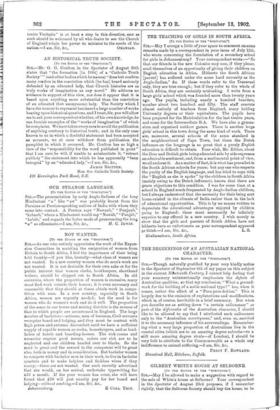THE TEACHING OF GIRLS IN SOUTH AFRICA.
[TO THE EDITOR OF THE "SPECTATOR."] Sra,—May I occupy a little of your space to comment on some remarks made by a correspondent in your issue of July 12th, who wrote concerning the foundation of a secondary school for girls in Johannesburg P Your correspondent wrote :—" So that our friends in the new Colonies may now, if they please, avail themselves of an opportunity of giving their children an English education in Africa. Hitherto the South African [parent] has suffered under the same hard necessity as the Anglo-Indian," 14c. If these words refer to the Transvaal only, they are true enough; but if they refer to the whole of South Africa, they are certainly misleading. I write from a large girls' school which was founded more than twenty years ago. The pupils, including nearly a hundred boarders, number about two hundred and fifty. The staff consists almost entirely of teachers from England, many holding University degrees or their equivalents. The pupils have been prepared for the Matriculation for the last twelve years, and some for the Intermediate B.A. We have also a gymna- sium and organised outdoor games. There is another large girls' school in this town doing the same kind of work. There are, moreover, several schools of the same standard in the neighbourhood of Cape Town, but there the Dutch influence on the language is so great that a purely English education is difficult to obtain. Your wish, Mr. Editor, about the Boer and British girls being educated side by side expresses an admirable sentiment, and, from a sentimental point of view, we all endorse it. As a matter of fact, it is what has prevailed in the South African schools for years; but any one who respects the purity of the English language, and has tried to cope with the "English as she is spoke" by the children in South Africa (mainly owing to the Dutch influence), knows that there are grave objections to this condition. I was for some time at a school in England much frequented by Anglo-Indian children, but I always understood that the necessity for their being sent home existed in the climate of India rather than in the lack of educational opportunities. This is by no means written to depreciate the educational advantages enjoyed by children going to England : these must necessarily be infinitely superior to any offered in a new country. I wish merely to show that the girls and parents of South Africa have not hitherto been so unfortunate as your correspondent appeared






































 Previous page
Previous page